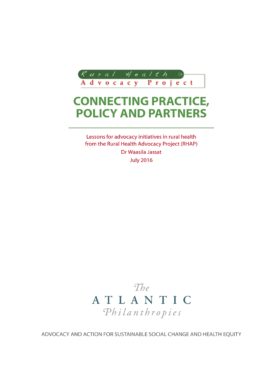Connecting Practice, Policy and Partners: Lessons for Advocacy Initiatives in Rural Health from the Rural Health Advocacy Project (RHAP)
Resource type: Research Report
Dr. Waasila Jassat |
This report discusses the impact of the Rural Health Advocacy Project (RHAP), a South African organization created in 2009 to advocate for the health care needs of people living in rural areas. Lessons from RHAP’s activities will be useful to both public health funders and those interested in supporting advocacy movements.
As in many countries, rural health has historically been neglected in South Africa. For those living in poor communities this meant long waiting times to see a doctor or healthcare provider, unnecessary referrals, poor quality of care, and even avoidable deaths. In addition, before RHAP was created, doctors and other health care workers had few opportunities to safely voice their concerns about service delivery problems.
The report found that in the years since the creation of RHAP, the group’s advocacy efforts have resulted in changes to how South Africa thinks about rural health issues and have led to new government policies specifically focused on health care needs of rural communities. RHAP’s advocacy has also helped address issues affecting the quality of care in rural areas, such as chronic shortages of medications.
Funders interested in supporting advocacy will find lessons they can apply to their work. Topics include:
- Selecting grantees
- Creating grantee cohesion
- Providing core funding
- Enabling growth and strengthening organizations
- Leveraging grants to secure funding
- Providing relaxed oversight and control
- Enabling innovation and adaptability
Learn More
Rural Health Advocacy Project is an Atlantic grantee via the Wits Health Consortium. Atlantic commissioned this report.
